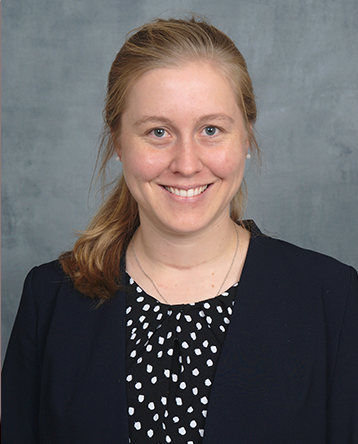Katherine Flanigan
Assistant Professor, Civil and Environmental Engineering
Assistant Professor, Civil and Environmental Engineering

Katherine Flanigan is an assistant professor in the Department of Civil and Environmental Engineering at Carnegie Mellon University (CMU). Flanigan also holds a courtesy appointment in the Department of Electrical and Computer Engineering at CMU. She received her Ph.D. in civil engineering from the University of Michigan in 2020. At the University of Michigan, Flanigan was an NSF Graduate Research Fellow, recipient of the College of Engineering Richard and Eleanor Towner Prize for Outstanding Ph.D. Research, and received master’s degrees in civil engineering in 2016, as well as electrical and computer engineering in 2018. Flanigan received her bachelor’s degree in civil and environmental engineering from Princeton University in 2014.
Flanigan’s research draws upon tools and technologies from across disciplines (such as civil engineering, electrical engineering, and computer science) to transform traditional civil infrastructure and urban systems into “intelligent” and adaptable cyber-physical systems (CPS). She focuses on integrating sensing, computing, and actuation technologies to improve the performance, resilience, accessibility, and sustainability of infrastructure and urban systems. This includes, for example, developing novel wireless sensing technologies for smart city sensor networks, using CPS and modeling to track the health and resilience of critical infrastructure (at both single-asset and system levels), and leveraging cloud-based data management and analytics to control natural and physical urban systems.
Flanigan’s work also extends CPS to cyber-physical-social systems (CPSS) by explicitly integrating human interaction, including responses to physical and cyber CPS elements. CPSS accounts for the interdependencies between physical and social systems (human-infrastructure interactions), which are becoming increasingly evident due to technological advancements that have introduced new components of social interaction when services are embedded within infrastructure systems. Her research aims to overcome both technical and social challenges to developing CPSS. This includes projects focused on integrating human-centric data and human-in-the-loop control solutions as well as understanding the role that CPS elements can play in promoting equity by deeply rooting policy-making and governance within community-driven data collection.
2020 Ph.D. Civil Engineering Intelligent Systems, University of Michigan
2018 M.S.E., Electrical and Computer Engineering, University of Michigan
2016 M.S.E., Civil Engineering, University of Michigan
2014 B.S.E., Civil and Environmental Engineering, Princeton University
Carnegie Mellon University Africa
Researchers from Carnegie Mellon University are investigating the patterns of human behavior in advanced manufacturing environments in order to improve human-machine collaboration.
CMU Engineering
Carnegie Mellon University researchers are bringing passenger rail back to communities by revitalizing existing rail lines—and in doing so, decreasing costs from billions to millions.
Civil and Environmental Engineering
Students from the first cohort of our Civil and Computer Engineering program share their experiences and why they chose to specialize in this emerging field.
CMU Engineering
Sophomore civil and environmental engineering project course teaches students the engineering design process by working with stakeholders to build habitats that protect local pollinator populations.
CMU Engineering
Civil and environmental engineering faculty have developed a testbed to make AI-enabled digital twins more accessible in the curriculum, but it is also proving valuable in active infrastructure research.
Civil and Environmental Engineering
CEE hosts its inaugural Spring Industry Day with speakers and panels discussing how cutting-edge technologies are reshaping the future of our field.
Civil and Environmental Engineering
CEE's Katherine Flanigan works with Facilities and Lab Engineer Brian Belowich to help CEE students construct Little Free Libraries housing various products, including books, plants, and tools to monitor the local environment.
Civil and Environmental Engineering
CEE PhD student Lindsay Graff received the prestigious K&L Gates Presidential Fellowship for her research in optimizing mobility subsidies and network investments in multi-modal transportation. Her work aims to address inequities in transportation infrastructure, ensuring fair distribution and meeting the diverse needs of communities.
Civil and Environmental Engineering
CEE PhD student Lindsay Graff has been awarded the prestigious Dwight David Eisenhower Transportation Fellowship from the U.S. Department of Transportation. Currently pursuing her PhD under the guidance of professors Sean Qian and Katherine Flanigan, Graff's research focuses on optimizing mobility subsidies and network investments in multi-modal transportation networks, addressing the growing need for efficient and sustainable urban transportation solutions.
Civil and Environmental Engineering
At CEE, we empower our students with the skills to make a real difference in their careers and communities. As students progress through their studies, our program threads approach allows for a deepening of their knowledge, expertise, and practical skills, ensuring that they are equipped to tackle real-world challenges with confidence and competence.
Civil and Environmental Engineering
Part Three: A Space Ripe for Innovation & Industry Collaboration
Civil and Environmental Engineering
Collaborating with industry leaders while combining infrastructure, data analysis, and computing expertise, CEE faculty are working on numerous digital twin projects. Their research aims to predict and prevent vehicle and equipment failures, maintain smart habitats in space, and optimize the safety, equity, and sustainability of various infrastructure systems.